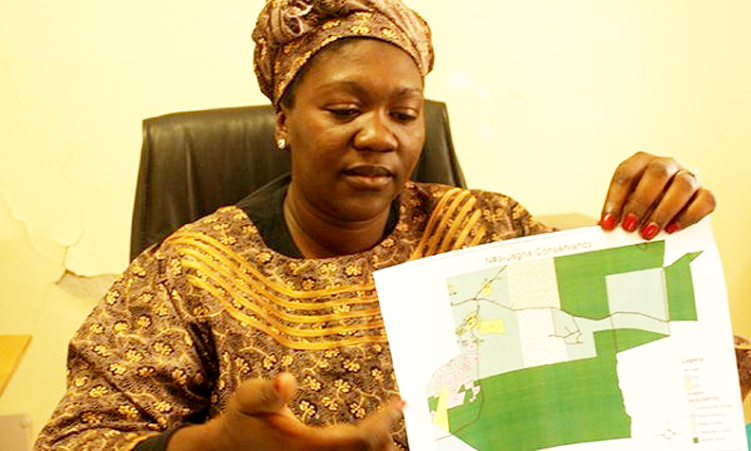Ministry of Agriculture, Water and Land Reform executive director Ndiyakupi Nghituwamata has defended the ministry’s stance on land tax policies, maintaining that they are not discriminatory, but rather a constitutional response to historical injustices.
“To say this is discriminatory is being very insensitive towards those that suffered injustices and discrimination during apartheid,” she said.
Nghituwamata was responding to queries on Tuesday on why only white farmers are required to pay land tax.
In December, the ministry sent out a notice on the land tax exemption procedures.
According to the procedures, previously disadvantaged individuals, non-profit organisations and all women, irrespective of their race or colour, are exempted from paying land taxes.
She said those exempted from land tax include agricultural landowners who have been socially, economically and educationally disadvantaged by past discriminatory laws or practices, specifically black and white women, and black men.
Asked whether white male farmers were excluded from the land tax exemption, she said the exemption is only applicable to land owned by persons as contemplated in Article 23(2) of the Namibian Constitution, read together with the Land Act Section 76B 1(a) of the Agricultural (Commercial) Land Reform Act (Act No.6 of 1995).
The category of women, according to Nghituwamata, is aimed at encouraging their equal participation in various aspects of life.
“All women are natural persons, however, because article 23(3) of the Namibian Constitution requires that since women in Namibia have traditionally suffered special discrimination, they should be given special treatment. Hence, in our categorisation, women are singled out to comply with the requirement of article 23(3) of the Namibian Constitution as a way of encouraging and enabling them to play a full, equal and effective role in the political, social, economic and cultural life of the Namibian nation,” she said.
She further said the policies should not be viewed as discriminatory, but rather as a means of addressing the social, political, economic and educational disparities that persisted during the apartheid era.
According to her, the policies align with constitutional provisions and relevant legislation until the desired advancements are achieved.
“This is not even discriminatory, it is an advancement of people who were previously discriminated against socially, politically, economically, and educationally by past apartheid discriminatory laws, practices, policies and programmes. And until such advancement is reached, as provided under article 23 and relevant legislation, e.g., the Affirmative Action Act and the Agricultural (Commercial) Land Reform Act (Act No.6 of 1995), these policies will continue to exist as they are constitutional,” she said.
Calls and text messages to agriculture minister Calle Schlettwein to weigh in on the matter proved futile.
FARMERS REACT
Farmer Steve Galloway says the move by the ministry is unnecessary and the government should concentrate on creating jobs.
“The previously disadvantaged farm owners are no longer disadvantaged. How long will you keep doing this?”
George Mostert, a farmer in the //Kharas region, says the farm land tax targeting only the male white population is unconstitutional and is an infringement on human rights.
He believes the move is against the law and merely an incorrect regulation in this election year.
“We believe the government will be brought to book in a class action in a court of law. Alternatively, our hope is also as a matter of good governance that minister Calle Schlettwein will refer this matter to the attorney general’s office for him to pronounce himself on this matter to the benefit of all Namibians and save the taxpayer money and time,” he said.
Mostert (35) was born after apartheid and claims that he did not benefit from the old dispensation.
“Farming has been extremely difficult due to climate change and forever droughts wiping out grazing, livestock and game. Most of the young farmers of today in Namibia bought their own farms or paid their parents as a settlement due to the high cost of living.
“The whole southern part of Namibia has very low breeding stock of goats and sheep due to this ongoing crisis. Feed is very expensive and not cost effective, as well as the closing of the borders from South Africa (due to foot and mouth disease) to bring in the fodder (lucerne, hay, etc) we so desperately need,” he adds.
He says the existing irrigation schemes charge very high prices and place a severe strain on the Hardap and Neckartal dams.
Member of parliament and United People’s Movement (UPM) president Jan van Wyk says the move by the ministry is wrong.
He believes there is a plan to force white farmers to sell their land.
“If we harass these people, they will sell the land,” he said.
Van Wyk confirmed that he is in support of the land reform programme, but it should be done in a responsible manner.
According to him, farmers should not be forced off the land because others need land.
“Many people have been resettled on commercial land and they are not working the land. Most of our white farmers are contributing to the economy of the country. They are successful in farming,” he said.
According to him, all farmers should be treated the same as they are all affected by the same natural disasters, like drought.
“People believe that white farmers are making a lot of money. Yes, some of them are, but in case of drought, people are suffering, and if you are not able to feed your animals and take them to the slaughterhouses, you are not making money. The government should look at the situation on the ground. You cannot just punish a white farmer because he has 10 000 hectares of land and there is no grazing on that land,” he said.
Stay informed with The Namibian – your source for credible journalism. Get in-depth reporting and opinions for
only N$85 a month. Invest in journalism, invest in democracy –
Subscribe Now!






